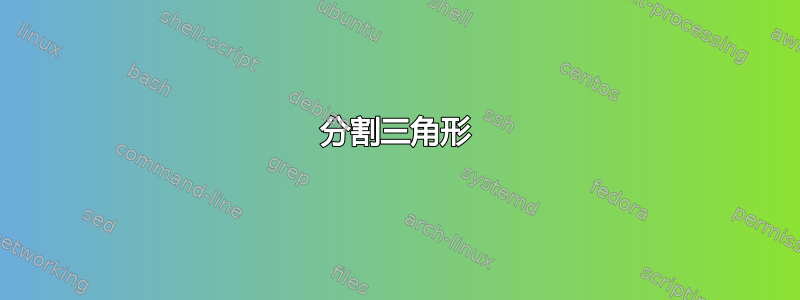
我正在写一篇关于整数分区的论文,我想添加类似这样的内容。这不是我的图片,它来自另一篇论文,但可以在 LaTex 上做到这一点吗?我希望能够自定义点的数量和点上的标签。任何帮助都将不胜感激
答案1
我不知道您到底需要什么样的更改,但也许这可能是一个起点。我的方法基本上是使用calc库来计算点的坐标。
\documentclass[border=2mm]{standalone}
\usepackage {amsmath} % for pmatrix
\usepackage {tikz}
\usetikzlibrary{calc} % for coordinates
\begin{document}
\begin{tikzpicture}[x={(-0.4cm,-0.3cm)},y={(1cm,0cm)},z={(0cm,1cm)},%
line cap=round,line join=round]
% coordinates
\def\a{2}
\def\b{4}
\def\c{4}
\coordinate (A) at (\a,0,0);
\coordinate (B) at (0,\b,0);
\coordinate (C) at (0,0,\c);
\coordinate (M) at ($(A)!0.5!(B)$);
\coordinate (G) at ($(C)!{2/3}!(M)$);
\foreach\i in {1,...,6}
{% dots in olive and red lines
\coordinate (A\i) at ($(A)!{\i/6}!(G)$);
\coordinate (C\i) at ($(M)!{\i/6}!(G)$);
}
% axes
\draw (0,0,0) -- (\a+1,0,0);
\draw (0,0,0) -- (0,\b+1,0);
\draw (0,0,0) -- (0,0,\c+1);
% other lines
\draw[thick,olive] (A) -- ($(B)!0.5!(C)$);
\draw[thick,gray] (B) -- ($(A)!0.5!(C)$);
\draw[thick,red] (C) -- ($(A)!0.5!(B)$);
\draw[thick,dashed,cyan] (A) -- (B);
\draw[thick] (A) -- (C) -- (B);
% dots
\fill (G) circle (2pt);
\foreach\i in {1,...,5}
{%
\pgfmathsetmacro\np{18-3*\i}
\foreach\j in {0,2,...,\np}
{%
\fill ($(A\i)!{\j/\np}!(C\i)$) circle (2pt);
}
}
% labels
\draw (G) circle (3pt) --++ (2cm,3cm)
node[right] {\small$\begin{pmatrix}6\\6\\6\end{pmatrix}$};
\draw (A1) circle (3pt) --++ (-1cm,1cm)
node[left] {\small$\begin{pmatrix}16\\1\\1\end{pmatrix}$};
\draw ($(A3)!{8/9}!(C3)$) circle (3pt) --++ (2cm,1cm)
node[right] {\small$\begin{pmatrix}8\\7\\3\end{pmatrix}$};
\end{tikzpicture}
\end{document}
答案2
图形的合理选择3D是Asymptote:
// file diag.asy
//
// run
// asy diag.asy
// to get a standalone image diag.pdf
//
settings.tex="pdflatex";
import graph3; size(200,0);
currentprojection=orthographic(camera=(67,9,14));
import fontsize; defaultpen(fontsize(7pt));
texpreamble("\usepackage{lmodern}\usepackage{amsmath}"
+"\usepackage{amsfonts}\usepackage{amssymb}");
triple A,B,C,D,E,F,G,H,K,L; real r=0.3;
A=( 6,6,6); B=(18,0, 0); C=(9, 9,0);
D=( 8,0,3); E=( 0,0,18); F=(0,18,0);
G=( 0,9,9); H=( 9,0, 9); K=(16,1,1); L=( 8,7, 3);
void drop(guide3[] g, pen[] p){
for(int i=0;i<g.length;++i) draw(project(g[i]),p[i]);
}
guide3[] line={B--E--F--cycle, B--G, E--C, F--H,
A--E--B, O--20*Y, O--22*X, O--20*Z,};
pen[] p={darkblue,deepgreen,red,blue,}; p.cyclic=true;
drop(line,p);
for(int i=0;i<7;++i){
for(int j=0;j<=9-i-ceil(i/2);++j){
dot(project(B+i*(-2,1,1)+j*(-1,1,0)),UnFill);
}
}
void labLoc(triple V, triple P){
pair v=project(V), p=project(P);
draw(circle(v,r)); draw((v+r*dir(p-v))--p);
label("$\begin{pmatrix}"+string(V.x)+"\\"+string(V.y)
+"\\"+string(V.z)+"\end{pmatrix}$",p,dir(p-v));
}
labLoc(A,(0,8,12));labLoc(K,(16,-2,4));labLoc(L,(0,12,9));




